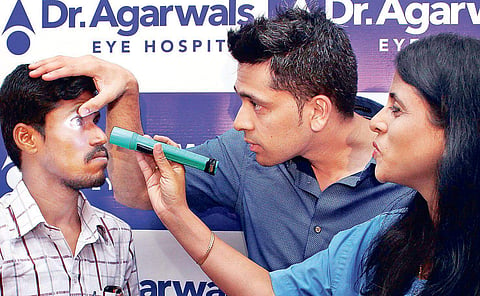

CHENNAI : Dr Agarwal’s Eye Hospital successfully conducted an innovative surgical treatment for Keratoconus, an eye disease where the cornea becomes thin and gradually develops into a conical shape, thereby creating serious impact on vision. This procedure called Corneal Allogenic Intra-Stromal Ring Segment (CAIRS) was successfully performed on a 25-year-old interior designer who had steep vision loss with discomfort while working. It was conducted one-and-a-half-years ago and its success has been validated now as patient need to be kept under observation for a period of time before a conclusion can be arrived at.
The CAIRS procedure is performed for Keratoconus patients by implanting corneal segments in the form of two semi-circular rings, which alter the shape of the cornea and result in improved vision. “It generally affects people within the age of 13-35 and affects their daily life as they are unable to see anything clearly even with spectacles. If there is someone who is rubbing their eyes a lot and if the power of their eyeglasses is continuously increasing, it must be checked for Keratoconus,” said Dr Ashvin Agarwal, Executive Director, Dr Agarwal’s Eye Hospital.
The procedure replaces the usual synthetic Intra-Stromal Corneal Ring Segments (ICRS) surgical therapy, and avoids the use of synthetic material. Although many patients experience notable improvement in vision with ICRS therapy, there are some cases where there is no subjective or objective improvement in vision.
“With the CAIRS procedure, the donor tissue is used instead of synthetic segments and the procedure is much more cost-effective. Where a synthetic segments procedure costs around `1.25 lakh, CAIRS costs `50,000. Also, the risk involved for the CAIRS procedure is lower than other procedures too,” said Dr Agarwal.The CAIRS procedure was performed first on G H Mohan Kumar (25), who works on interiors and furniture. A resident of Arani, Kumar was having a lot of discomfort and difficulty performing his regular tasks as a result of Keratoconus. This procedure received the ‘Best Paper Award’ from the American Society of Cataract and Refractive Surgery, Los Angeles.